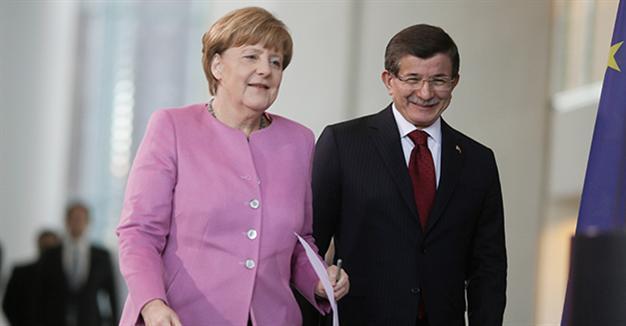Two Merkel ministers back Turkey’s EU bid
MAGDEBURG - The Associated Press

German Chancellor Angela Merkel, left, and the Prime Minister of Turkey Ahmet Davutoğlu arrive for a news conference after German-Turkish government consultations at the chancellery in Berlin, Germany, Friday, Jan. 22, 2016. AP Photo
Two ministers from German Chancellor Angela Merkel’s government have voiced support for Turkey’s European Union bid, two days before elections in three federal states will prove if Merkel has lost ground or not due to her open-door migrant policy that came under criticisim especially from nationalist parties.
“I am for the opening of the chapter on justice and human rights, finally,” German Justice Minister Heiko Maas of Social Democrats (SPD) told German magazine Spiegel in an article published on March 11. “Then Turkey would need to provide [clauses] such as press freedom and the rule of law justice.”
It is “right to further accommodate the negotiations on Turkey’s EU membership now,” said Ursula von der Leyen, German defense minister of Christian Democratic Union (CDU), told SPIEGEL. This process will “run for years “ and would also be “good for the people of Turkey.”
At the three state elections on March 13, a rising nationalist party may ride unease about Merkel’s migrant policy, which will be the first significant political test since last year’s massive influx of people seeking safety and a better life.
Alternative for Germany, or AfD, formed three years ago, is wooing voters with slogans such as “ENOUGH!” and “Secure borders instead of borderless crime.”
The party is expected to enter legislatures on March 13 in the diverse regions: prosperous Baden-Württemberg in the southwest, neighboring Rhineland-Palatinate, and relatively poor Saxony-Anhalt in the east. Other parties are not expected to share power with it, but its performance could complicate efforts to form state governments - particularly in Saxony-Anhalt, where polls give it up to 19 percent support.
Germany registered nearly 1.1 million people as asylum-seekers last year as Merkel insisted “we will manage” the challenge, a stance lauded by many but that drove others into AfD’s arms.
“What she did was issue a political invitation to a great many people in the world to set off for Europe, with catastrophic consequences for the structure of a Europe of freedom,” AfD leader Frauke Petry recently told foreign reporters.
Merkel seeks pan-European solution
Merkel is doggedly pursuing an elusive pan-European solution to the migrant crisis, even as other countries shut borders and German conservative allies demand national measures such as refugee quotas. Asked recently what would make her change course, she replied: “I cannot see anything that could bring that about, because it is all well thought-through and logical.”
But Petry, whose party already has lawmakers in five German state parliaments and at the European Parliament, argues that “having taken more than 1 million asylum seekers and awaiting many more, awaiting families as well, is going to cause huge problems in Germany.”
Merkel said this week that for “all those who want a constructive solution, who want to move things ahead, AfD is completely the wrong party,” accusing it of “working with emotions.”
Merkel’s own ratings have fallen over recent months but started recovering. The next national election is expected in late 2017, by when other parties hope AfD’s popularity will have subsided.
However, March 13 looks like being uncomfortable for both Merkel’s conservative CDU and its national government partners, the center-left SPD.
Merkel’s party leads Saxony-Anhalt’s government and hopes to oust center-left governors in the other two states. Chances of that no longer look so good.
